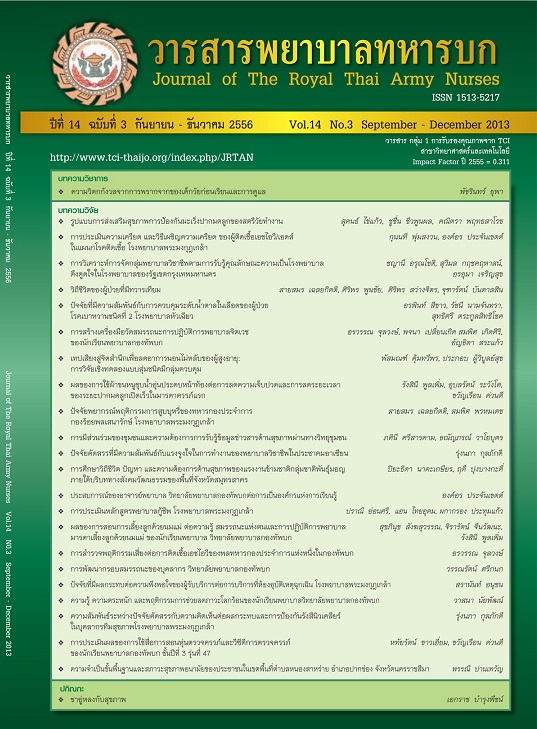ปัจจัยที่มีความสัมพันธ์กับการควบคุมระดับน้ำตาลในเลือดของผู้ป่วยโรคเบาหวานชนิดที่ 2 โรงพยาบาลหัวเฉียว Factors Associated with Glycemic Control in Type 2 Diabetic Patients at Hua-Chiew Hospital
Keywords:
การควบคุมระดับน้ำตาลในเลือด, ดัชนีมวลกาย, ปัจจัยเสี่ยง, พฤติกรรมการดูแลตนเองผู้ป่วยโรคเบาหวานชนิดที่ 2, Glycemic control, BMI, Risk factors, Self care behavior, Type 2 diabetic patientsAbstract
การศึกษาครั้งนี้เป็นการวิจัยเชิงพรรณนาแบบภาคตัดขวาง (cross-sectional descriptive research design)มีวัตถุประสงค์เพื่อศึกษาปัจจัยที่สัมพันธ์กับการควบคุมระดับน้ำตาลในเลือด และปัจจัยเสี่ยงต่อการควบคุมระดับน้ำตาลในเลือดไม่ได้ของผู้ป่วยโรคเบาหวานชนิดที่ 2 ที่มารับบริการที่โรงพยาบาลหัวเฉียว กลุ่มตัวอย่างเป็นผู้ป่วยโรคเบาหวานชนิดที่ 2 ที่เลือกอย่างเฉพาะเจาะจง จำนวน 366 คน เครื่องมือที่ใช้ในการวิจัยประกอบด้วยแบบบันทึกข้อมูลส่วนบุคคล ข้อมูลเกี่ยวกับความเจ็บป่วย และแบบสอบถามพฤติกรรมการดูแลตนเอง ซึ่งมีค่าสัมประสิทธิ์แอลฟาของครอนบาคของกลุ่มตัวอย่างเท่ากับ .77 วิเคราะห์ข้อมูลด้วยสถิติเชิงพรรณนา การทดสอบไคสแควร์ ฟิชเชอร์เอกแซค สหสัมพันธ์เพียร์สันและการถดถอยแบบโลจิสติก
ผลการศึกษาพบว่า ปัจจัยที่มีความสัมพันธ์กับการควบคุมระดับน้ำตาลในเลือดอย่างมีนัยสำคัญทางสถิติที่ระดับ .05 ได้แก่การประกอบอาชีพ ประวัติการเข้ารับการรักษาตัวในโรงพยาบาลในระยะ 1 ปีที่ผ่านมา และชนิดของยาที่ใช้ในการรักษา พฤติกรรมการดูแลตนเองมีความสัมพันธ์ทางลบในระดับต่ำมากกับระดับน้ำตาลสะสมในเลือด (r = -.137, p<.05) ปัจจัยเสี่ยงต่อการควบคุม ระดับน้ำตาลในเลือดไม่ได้ของผู้ป่วยโรคเบาหวานชนิดที่ 2 อย่างมีนัยสำคัญทางสถิติที่ระดับ .05 ได้แก่ ภาวะอ้วน (OR = 1.745, 95%CI = 1.003-3.036) ไม่มีประวัติการเข้ารับการรักษาตัวในโรงพยาบาลในระยะ 1 ปีที่ผ่านมา (OR = 1.945, 95% CI = 1.150-3.287) และได้รับยาฉีดอินซูลิน (OR = 2.102, 95% CI = 1.166-3.789) ปัจจัยเหล่านี้ร่วมกันทำนายการควบคุมระดับน้ำตาลในเลือดไม่ได้ ได้ร้อยละ 8.9 และทำนายได้ถูกต้องร้อยละ 60.8
ผลการวิจัยให้ข้อเสนอแนะในการจัดโปรแกรมการพยาบาลสำหรับกลุ่มผู้ป่วยที่เสี่ยงต่อการควบคุมระดับน้ำตาลในเลือดไม่ได้ ซึ่งได้แก่ กลุ่มผู้ป่วยที่อ้วน ผู้ที่ไม่มีประวัติเข้ารับการรักษาตัวในโรงพยาบาลในระยะ 1 ปีที่ผ่านมา และได้รับการรักษาด้วยยาฉีดอินซูลิน
The purposes of this cross-sectional descriptive research design were to examine factors associated with glycemic control and risk factors for glycemic uncontrollability in type 2 diabetic patients at Hua-Chiew Hospital. Purposive sampling was used to recruit a sample of 366 patients. Research instruments consisted of 1) Personal and Illness Related Data recording form and 2) Self Care Behavior Questionnaire. The reliability of the questionnaire was 77 tested by Alpha Chronbach Coefficient. Data were analyzed using descriptive statistics, Chi-square test, Fisher’s exact test, Pearson’s correlation and logistic regression.
The results showed that factors significantly related to glycemic control were occupation, history of hospitalization within the past one year, and types of prescribed drugs (p<.05). Self-care behavior was negatively associated with HbA1C in a very small degree (r = -.137, p<.05). Risk factors for glycemic uncontrollability in type 2 diabetic patients were obesity (OR= 1.745, 95% CI=1.003-3.036), no history of hospitalization within the past one year (OR=.1.945, 95% CI=1.150-3.287) and receiving insulin injection (OR = 2.102, 95% CI= 1.166-3.789). These factors could predict glycemic uncontrollability for 8.9%. (R2= .089) and the overall percentage of correct classification was 60.8%. The results suggest a need of nursing programs for type 2 diabetic patients who are at risk of glycemic uncontrollability such as obesity, no history of hospitalization within the past one year and receiving insulin injection.
Downloads
Downloads
How to Cite
Issue
Section
License
บทความหรือข้อคิดเห็นใดใดที่ปรากฏในวารสารพยาบาลทหารบกเป็นวรรณกรรมของผู้เขียน ซึ่งบรรณาธิการหรือสมาคมพยาบาลทหารบก ไม่จำเป็นต้องเห็นด้วย
บทความที่ได้รับการตีพิมพ์เป็นลิขสิทธิ์ของวารสารพยาบาลทหารบก
The ideas and opinions expressed in the Journal of The Royal Thai Army Nurses are those of the authors and not necessarily those
of the editor or Royal Thai Army Nurses Association.






